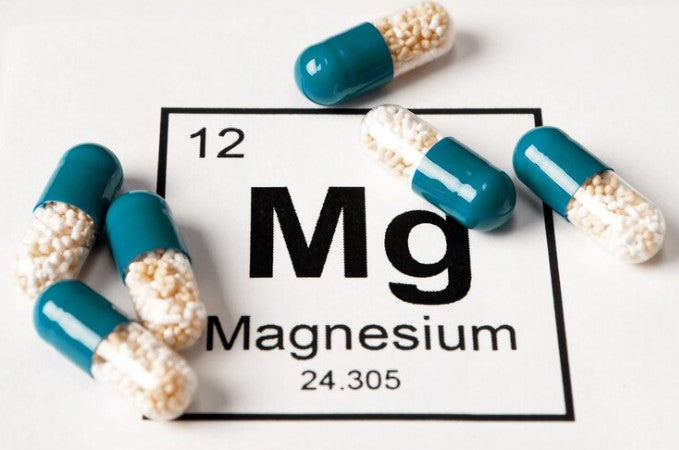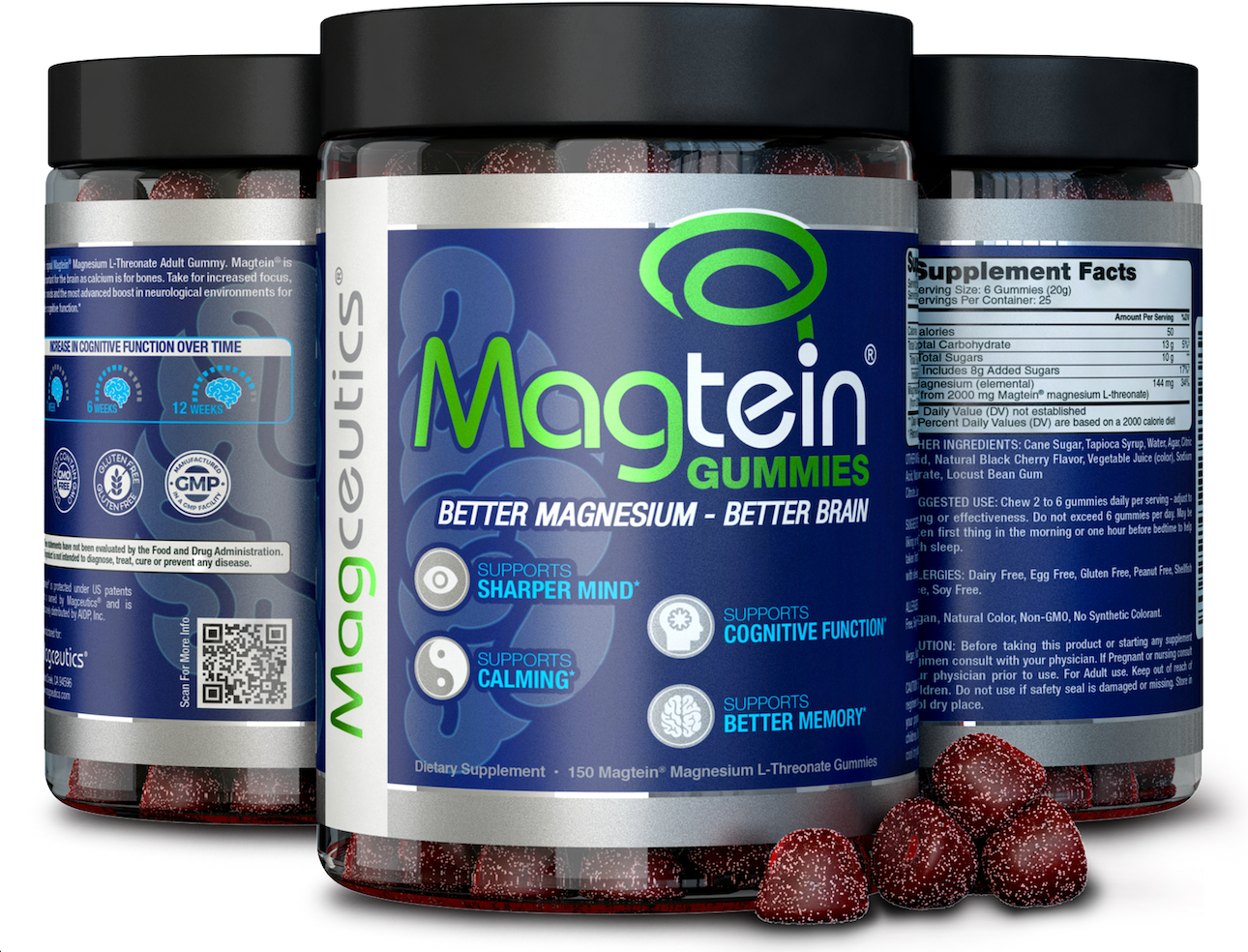
Which Magnesium Is Best for Anxiety?
Feeling overwhelmed, restless, or constantly on edge? You're far from alone. Anxiety affects millions of Americans, and while there are many approaches to managing it, more people are exploring natural options like magnesium supplementation.
But here's the thing: the type of magnesium you choose can make all the difference in how effectively it supports your mood and stress response.
So, which magnesium is best for anxiety? The answer comes with understanding how different forms work in your body, and which one targets the root of anxious feelings most effectively. While all magnesium plays a role in nervous system function, some forms are specifically designed to support the brain's mood regulation centers.
Does Magnesium Help Anxiety? Here's What We Know
Anxiety can show up in countless ways: racing thoughts, physical tension, difficulty concentrating, restless sleep, or that constant feeling of being "wound up." These symptoms often stem from an overactive stress response system that struggles to find its off switch.
Taking a magnesium supplement for anxiety is a trend that has increased in popularity as people seek natural vs pharmaceutical answers to this common issue. This makes sense when you understand magnesium's role in your body's stress response system.
The Science Made Simple
Does magnesium help anxiety? Research suggests it absolutely can, and here's why: magnesium acts like a natural brake pedal for your nervous system. It helps regulate neurotransmitters—the chemical messengers that influence your mood—and supports healthy cortisol levels.
When your magnesium levels are optimal, your body can:
- Better regulate the stress hormone cortisol
- Support GABA production, a neurotransmitter that promotes calmness
- Maintain healthy muscle relaxation, reducing physical tension
- Support quality sleep, which is crucial for emotional balance
The challenge is that stress itself depletes magnesium, creating a cycle where anxiety can increase magnesium deficiency. This is why choosing the right magnesium supplement for anxiety becomes so important.
What's the Best Magnesium for Anxiety?
Not all magnesium supplements work the same way in your body. Understanding their key differences will help you choose the best form of magnesium for anxiety based on your specific needs.
Magnesium Citrate
This form combines magnesium with citric acid, creating a supplement that's reasonably well-absorbed but can have a laxative effect.
Best for: People who want anxiety support along with digestive benefits, but may not be ideal for daily use due to potential bathroom urgency.
Magnesium Oxide
While inexpensive and widely available, magnesium oxide has poor absorption rates—meaning much of it passes through your system without being used.
Not typically recommended as the best magnesium for anxiety due to absorption limitations.
Magnesium L-Threonate (Magtein®)
This is where things get interesting for anxiety support. Magtein for anxiety offers a unique approach because it's specifically formulated to cross the blood-brain barrier and increase magnesium levels directly in brain tissue.
Best for: People whose anxiety involves racing thoughts, difficulty concentrating, or who often feel emotionally overwhelmed—essentially targeting anxiety at its neurological source.
Shop Magtein Magnesium Products
Magnesium Glycinate
This form pairs magnesium with the amino acid glycine, which has its own calming properties. It's gentle on the stomach and well-absorbed.
Best for: General relaxation and physical calm, especially for people whose anxiety manifests as muscle tension or sleep difficulties.
When's the Best Time to Take Magnesium for Anxiety?
As far as timing, it depends on when you most need support and which symptoms you're targeting:
Morning
Taking magnesium in the morning can help establish a foundation of calm for the day ahead. This is particularly helpful if you experience:
- Morning anxiety or anticipatory worry
- Difficulty focusing due to racing thoughts
- Physical tension that builds throughout the day
For brain-targeted support, taking Magtein in the morning can help maintain mental clarity and emotional balance during stressful situations.
Evening
Many people prefer evening supplementation, especially if anxiety interferes with sleep quality. Evening timing works well for:
- Winding down from a stressful day
- Preparing the mind and body for rest
- Breaking the cycle of nighttime worry
Consistency Matters Most
Regardless of timing, taking your supplement at the same time each day helps establish steady levels in your system. Start with one consistent time and adjust based on how you feel and what benefits you notice.
Dosage Considerations
While individual needs vary, most adults find benefit from 200-400mg of elemental magnesium daily. Magtein for anxiety support typically requires 1,500-2,000mg of the compound (providing about 144mg of elemental magnesium) due to its specialized formulation. Always consult with a healthcare provider before starting any new supplement regimen.
Which Magnesium Should You Choose for Anxiety?
Choosing the best magnesium for anxiety depends on your primary symptoms and goals:
Choose Magtein® if:
- Your anxiety involves racing thoughts or cognitive overwhelm
- You want to address anxiety at the brain level
- Mental clarity and emotional balance are priorities
- You're looking for targeted neurological support
Choose Magnesium Glycinate if:
- Your anxiety manifests primarily as physical tension
- You need general relaxation support
- Sleep quality is your main concern
- You prefer a well-researched, gentle option
Magtein® for Anxiety: How It Supports Mood and Stress
Magtein has become the leading, most targeted approach to managing stress and emotional overwhelm. Unlike general magnesium options that work primarily on physical symptoms, Magtein® specifically addresses the brain's stress response systems.
Supports Emotion Regulation
Your brain's emotion regulation centers require adequate magnesium to function optimally. Magtein delivers magnesium directly to these neural networks, supporting your brain's natural ability to:
- Process emotional information more effectively
- Maintain perspective during stressful situations
- Respond rather than react to challenging circumstances
- Support emotional resilience over time
Aids in Managing Stress Responses
The stress response system involves complex interactions between different brain regions. When your brain has optimum magnesium levels, it can help:
- Moderate the initial stress response
- Support faster recovery from stressful events
- Maintain healthy cortisol patterns
- Reduce the physical symptoms of chronic stress
Enhances Mental Clarity and Calm
One of the unique aspects of Magtein’s anxiety support is how it addresses both the cognitive and emotional components of anxious feelings. Users often report:
Clearer thinking during stressful situations
- Reduced mental "chatter" or racing thoughts
- Better decision-making under pressure
- A sense of calm alertness rather than sedation
More Targeted Than General Options
While traditional magnesium supplements work on peripheral systems, Magtein actually targets the source—your brain's stress response centers. This targeted approach means you're addressing anxiety where it starts, rather than just managing its physical symptoms.
The blood-brain barrier crossing ability of Magtein makes it uniquely suited for supporting the neurological aspects of mood and stress management that other forms simply cannot reach as effectively.
Ready to Feel Calmer and More Focused?
If you're tired of feeling overwhelmed and want to address anxiety at its source, Magtein offers a science-backed approach to cognitive and emotional health. Our authentic Magtein® capsules, offered in two targeted formulations based on clinical research, ensure you get the targeted brain health benefits that make this form of magnesium so unique.
Rather than just masking symptoms, it works to support your brain's natural stress management systems. This means not only feeling calmer, but also maintaining mental clarity and emotional resilience when life gets challenging.
Explore our Magtein® collection and support your cognitive and emotional health with the best magnesium for anxiety.
FAQs About Magnesium and Anxiety
Can I take Magtein® daily for anxiety?
Yes, it is designed for daily use and often works best with consistent supplementation. Most people take it daily as part of their overall wellness routine. The gradual improvement in stress response and emotional balance tends to become more noticeable with regular use rather than sporadic supplementation.
How long does it take to notice a difference?
The benefits can manifest at different rates for different people. Some individuals notice improved sleep quality or a subtle sense of calm within the first week. However, the more significant cognitive and emotional benefits—like better stress resilience and improved emotional regulation—typically develop over 4-8 weeks of consistent use. This gradual timeline reflects how Magtein works at the cellular level to support long-term brain health rather than providing immediate sedation.
Is Magtein® safe with other supplements?
Magtein for anxiety generally combines well with other supplements and is often part of a comprehensive wellness approach. Many people successfully take it alongside omega-3s, B vitamins, and other brain health nutrients. However, if you're taking other magnesium supplements, be mindful of your total daily magnesium intake. It's also wise to space Magtein® a couple of hours apart from calcium or iron supplements for optimal absorption. As with any supplement combination, consulting with a healthcare provider ensures the best approach for your individual situation.


